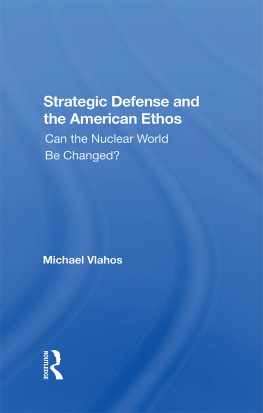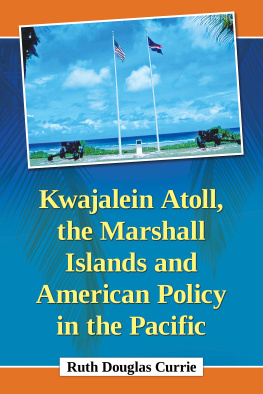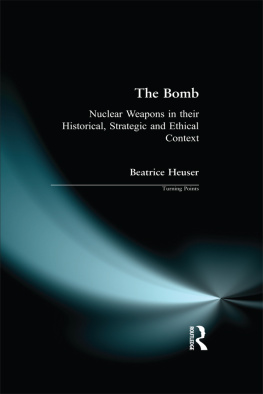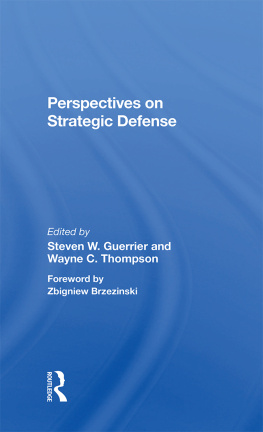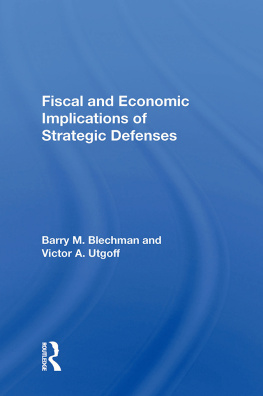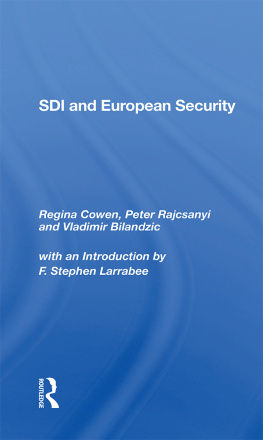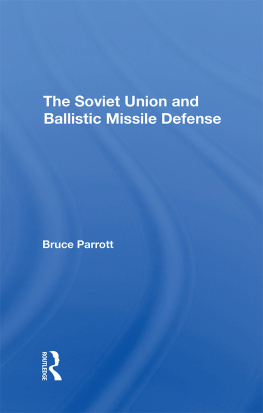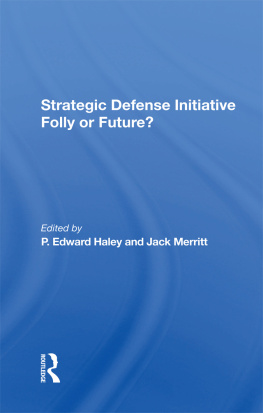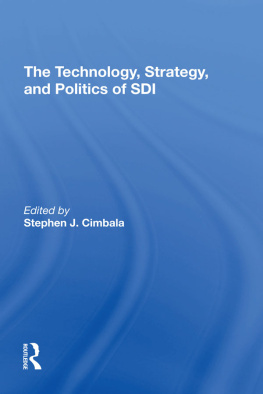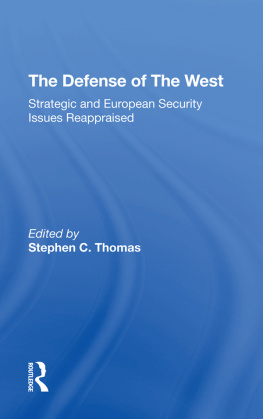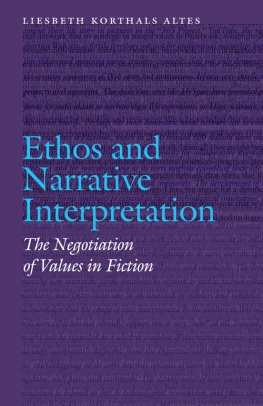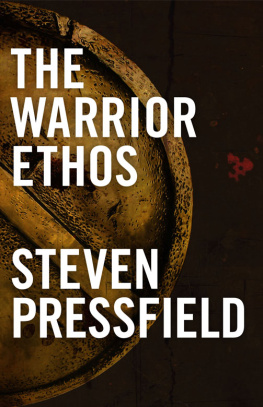Strategic Defense and the American Ethos
THE JOHNS HOPKINS FOREIGN POLICY INSTITUTE
Harold Brown
Chairman
Simon Serfaty
Executive Director
Robert E. Osgood
Codirector
Security Studies Program
Wilfrid Kohl
Director
International Energy Program
Philip Geyelin
Editor-in-Residence
Michael Vlahos
Codirector
Security Studies Program
Nancy McCoy
Editorial Coordinator
George R. Packard
Dean, School of Advanced International Studies, The Johns Hopkins University
The Johns Hopkins Foreign Policy Institute (FPI) was founded in 1980 and serves as the research center for the School of Advanced International Studies (SAIS) in Washington, D.C. The FPI is a meeting place for SAIS faculty members and students as well as for government analysts, policymakers, diplomats, journalists, business leaders, and other specialists in international affairs. In addition to conducting research on policy-related international issues, the FPI sponsors conferences, seminars, and roundtables.
The FPI's research activities are often carried out in conjunction with SAIS's regional and functional programs dealing with Latin America and the Caribbean Basin, U.S. foreign policy, U.S.-Japan relations, Canada, Africa, Europe, security studies, international energy, and international economics.
FPI publications include the SAI SAS Review, a biannual journal of foreign affairs, which is edited by sais students; the SAIS Papers in International Affairs, a monograph series copublished with Westview Press in Boulder, Colorado; and the FPI Policy Briefs, a series of analyses of immediate or emerging foreign-policy issues.
Strategic Defense and the American Ethos: Can the Nuclear World Be Changed? is the second in a series of five books. This series is being prepared by the FPI as part of a research project on the long-term implications of military programs and activities in space for strategic stability, superpower relations, and alliance cohesion.
For additional information regarding FPI publications, write to: FPI Publications Program, School of Advanced International Studies, The Johns Hopkins University, 1740 Massachusetts Avenue, NW, Washington, DC 20036.
About the Book and Author
The concept and utility of strategic defense should be evaluated in an embracing cultural context defined by the values, attitudes, and worldview of societyits ethos. The Strategic Defense Initiative (SDI) responds both to changes in the American ethos and to shifts in the balance of power. Together, these changes have undermined the basis of U.S. force posture and alliance relationships in the nuclear era: deterrence through the threat of nuclear retaliation. Dr. Vlahos argues that SDI offers an escape from a strategic cul-de-sac and provides an alternative to a national security policy many Americans believe to be unworkable. Those Americans who reject SDI do so on the grounds that it is technologically infeasible or that only arms controlnot more weaponscan secure peace. Yet even less-than-perfect defenses could serve important limited goals, according to Dr. Vlahos. Initially, limited defenses could enhance deterrence, and as defenses evolved, they might reshape the strategic environment, shifting the emphasis of U.S.-Soviet competition away from ballistic missiles and the primacy of offensive nuclear forces.
This book links the larger cultural process from which strategic posture is ultimately derived to the utility of strategic defenses. If strategic defenses are a product of cultural pressures, they must also promote the goal of such pressures: enhanced national security. This is the promise of SDI.
Michael Vlahos is codirector of the Security Studies Program at The Johns Hopkins School of Advanced International Studies (SAIS). He is also a research professor of security studies at SAIS and staff consultant to The Johns Hopkins Applied Physics Laboratory. His previous books include The Blue Sword: The Naval War College and the American Mission, 1919-1941 (1981) and America: Images of Empire (1982).
Number 13
Sais Papers in International Affairs
Strategic Defense and the American Ethos
Can the Nuclear World Be Changed?
Michael Vlahos
First published 1986 by Westview Press
Published 2019 by Routledge
52 Vanderbilt Avenue, New York, NY 10017
2 Park Square, Milton Park, Abingdon, Oxon OX14 4RN
Routledge is an imprint of the Taylor & Francis Group, an informa business
Copyright 1986 by The Johns Hopkins Foreign Policy Institute, School of Advanced International Studies (SAIS)
All rights reserved. No part of this book may be reprinted or reproduced or utilised in any form or by any electronic, mechanical, or other means, now known or hereafter invented, including photocopying and recording, or in any information storage or retrieval system, without permission in writing from the publishers.
Notice:
Product or corporate names may be trademarks or registered trademarks, and are used only for identification and explanation without intent to infringe.
Library of Congress Catalog Card Number: 86-28990
ISBN 13: 978-0-367-28883-9 (hbk)
There are many people I wish to thank: Harold Brown, for giving me incentive; Paul Nitze and Simon Serfaty, for their support; Bruce Valley, Adam Garfinkle, Dan Gour, Charles Fairbanks, Bob Osgood, Tom Evans, and Bruce Jackson, who selflessly read through draft after draft; Nancy McCoy, for her limpidity of thought; and, last, my father, who helped me find my voice.
America is talking again about how to defend itself from attack. For decades, since Hiroshima, this nation has wrestled with the possible consequences of a war in which nuclear weapons were launched against the United States. With the advent of the hydrogen bomb, we faced the prospect of potential national extinction if such weapons hit America. Still, we tried to defend against these terrible things. Had we any choice? Could we rely on the restraint of our sworn enemy and yield our securityeven our survivalto a trust that nuclear weapons would not be used?
Of course not. We tried to develop defenses, aircraft and missiles that would shoot down the bombers that could attack the United States with nuclear bombs. Then came the ICBM Sputnik the intercontinental ballistic missile. Against this weapon, arcing into space and back at hypersonic speed, there was no defense.
There was an alternative doctrine, a simple concept really, that could substitute for real defenses. This was a doctrine called deterrence. It meant, quite simply, that the United States would deter nuclear attack with the threat of disproportionate counterattack. If the Soviet Union launched nuclear missiles at the United States, we would retaliate by launching nuclear missiles back at them. We would threaten their ultimate destruction. Although we might not initially respond by destroying the Soviet Union, we would do so if the Soviets attempted to incinerate America.
The Soviets would gain nothing from their awesome power to destroy the United States. We could not gain by threatening to destroy them. Neither party would benefit from nuclear use. Nuclear war could not be "won" if both sides were destroyed. Checkmate. Deterrence works.

